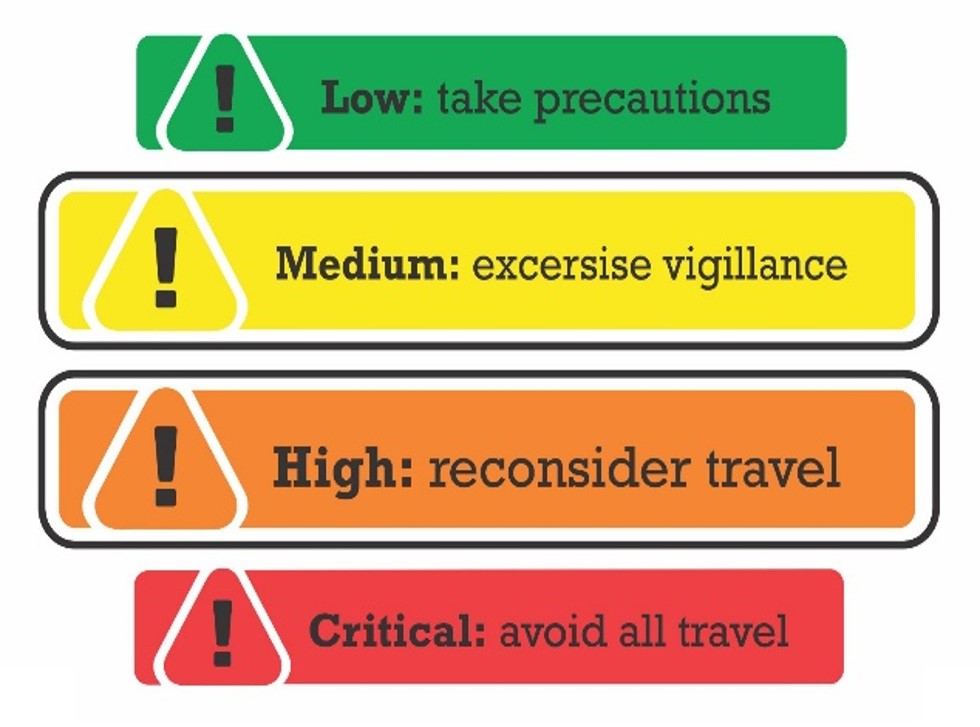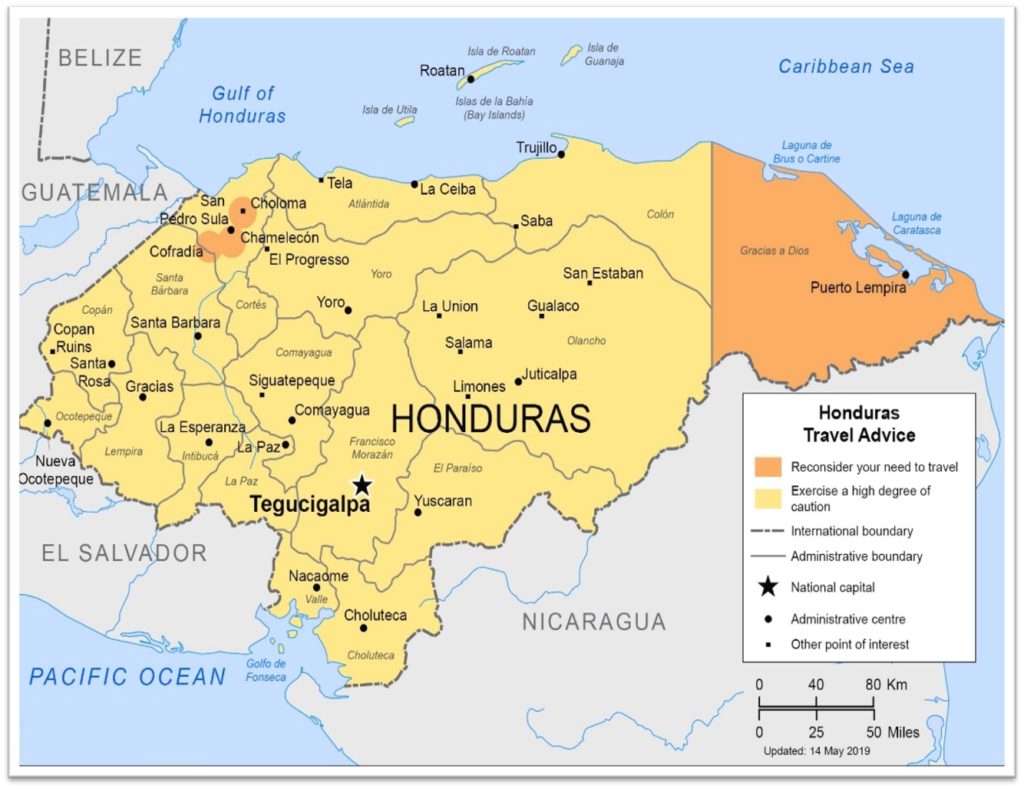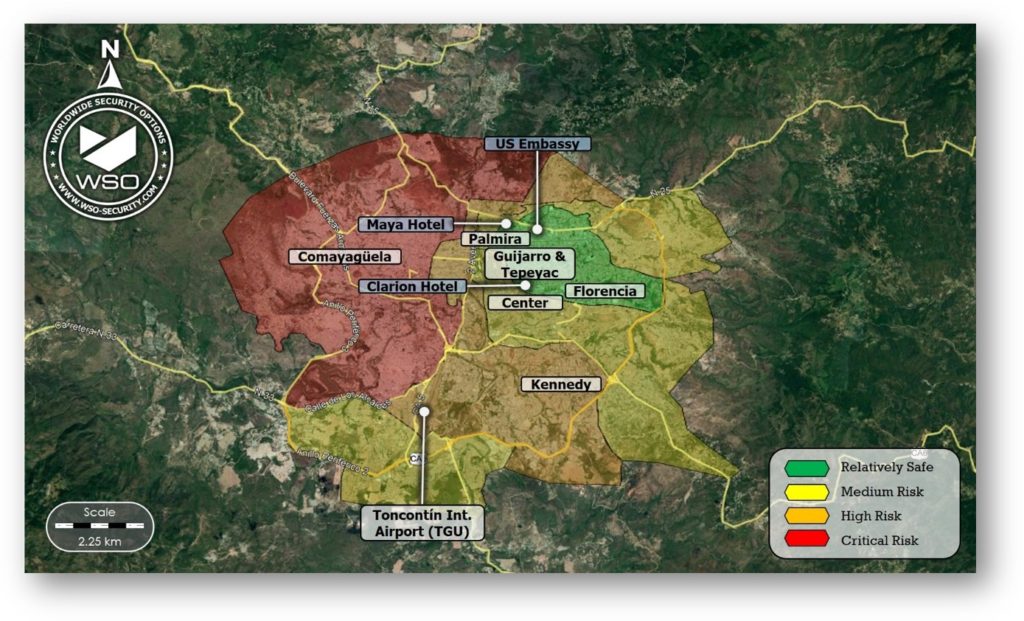| Official Name: | Republic of Honduras |
| Official Language: | Spanish |
| Area: | 112,492 km2 (43,433 sq mi) |
| Population: | 9,590,500 |
| Time Zone: | UTC−6 |
| Capital City: | Tegucigalpa |
| Height (Tegucigalpa): | 990 m (3,250 ft) |
| Currency: | Lempira (HNL) |
| Main Cities: | Tegucigalpa, Comayagüela, San Pedro |
| Main Port: | Port of Cortés |
| Required visa for entry: | Nationals from Canada, EU countries, the UK, and others DO NOT require visas. Click here for more information concerning visa requirements. |
| Required vaccination for entry: | Yellow fever (only for endemic countries. Review epidemiological alerts by clicking here) |

Main Risks:
Theft, robbery, kidnapping, extortion, rape, drug and human trafficking, fraud, vehicle assault.
Executive Summary
Honduras features intermediate and high risks depending on the area of the country. Security risks increase considerably in San Pedro Sula and impoverished areas of Tegucigalpa, as well as in rural and bordering zones with neighboring countries. The Gracias a Dios Department is considered virtually anarchic due to the government’s inability to maintain order. Given that criminals are heavily armed, we strongly recommend hiring secure transportation services before traveling to the country. If the trip involves business or high profile agendas, we also recommend hiring executive protection services.

General Risk Level: MEDIUM AND HIGH.
The risk varies according to the area in the country. It is essential to avoid high-risk areas, including impoverished neighborhoods in the main urban areas. In these zones, there is an insufficient police presence and security services are inefficient. It is thus necessary to review security considerations before traveling to Honduras.

Crime and Security
Honduras features high rates of crime and is considered one of the most violent countries in the world. Organized crime is the main threat to national security. Clashes between armed groups (“maras”) fighting for influence and territory are commonplace, especially between Salvatrucha (MS13) and the Barrio 18 gangs. San Pedro Sula and its surrounding localities are especially vulnerable to organized crime. Although San Pedro Sula is the most relevant city in commercial and industrial terms, drug-trafficking and extortion crimes against local businessmen and freight carriers are commonplace. Moreover, gangs exercise territorial control in impoverished neighborhoods where there is rarely effective police control. A similar situation takes place in some areas in Tegucigalpa. It is worth noting that critical risk areas are also exposed to shootings and clashes between opposing gangs and security forces, particularly during raids.
The risk posed by organized crime increases while traveling by road in the countryside. Criminal groups are known to target drivers by mounting obstructions to halt traffic. Gangs are known to coerce drivers into paying the so-called “blood taxes” (“impuestos de sangre) to finance their operations. In this regard, please take into account that rural areas are not sufficiently guarded by security forces. This is especially the case in the Gracias a Dios department.
Due to the rainforest, the northeastern part of the country is sparsely populated and there is little state infrastructure. These conditions are traditionally capitalized by drug-trafficking groups.
Low and medium-level crime represents the main threat to travelers visiting the country, provided they refrain from venturing into high-risk areas. Travelers should, if possible, remain within the most privileged zones in Tegucigalpa and San Pedro Sula, not for nothing known as “secure neighborhoods” (barrios seguros”). These tend to gather the upper classes, foreign and business interests, so they are better protected by security services. That said, even the safest areas are liable to witness violent crime.
Taking into account the risks posed by crime, it is paramount to avoid non-essential travel to locations in the countryside, including beachside areas such as La Ceiba or Trujillo. Unlike what transpires in other countries in Latin America, in Honduras, even low-level criminals can acquire heavy weaponry. Foreigners might become a target due to perceptions of wealth. For these reasons, some Western embassies warn their citizens of the potential for kidnapping.
Due to the circumstances, we strongly advise travelers to procure secure transportation services before traveling to Honduras, whether for business or pleasure. For security reasons, unless previously vetted by security professionals, taxis should not be employed.
On another note, it is also important to remain cognizant of political developments in the country. Political stability in Honduras is often put into question due to high profile corruption scandals undermining the legitimacy of successive governments. Protests in Honduras often turn violent, leading to scuffles between activists and police. Hence, visitors should avoid the vicinity of any unfolding demonstration. Finally, please bear in mind that Honduras has a hurricane season between June and November. Adverse weather can lead to security risks, especially in seaside areas, and may lead to travel disruptions and deficiencies in basic services.
Security in Tegucigalpa
The safest neighborhoods (“colonias”) in Tegucigalpa recommended for lodging, travel, and conducting business and transactions are Palmira, Lomas del Guijarro, Lomas del Mayab, Florencia, and Tepeyac. The safest areas are located in the northeast and central parts of the city. These zones are perceivably safer than others because they are better protected by security forces and private security agents. That said, in Tegucigalpa, it is essential to exercise constant vigilance. Even the most privileged sites can witness violent crimes. High and critical risk areas are generally located in the west. These should be avoided, including the neighboring city of Comayagüela, especially without executive protection and secure transportation services.

The Teniente Coronel Hernán Acosta Mejía International Airport (TGU), better known as “Toncontín”, is located approximately 30 minutes away from Palmira. Bear in mind that the route from/to the airport entails crossing through high-risk areas. Due to this situation, it is best to avoid traveling during the night hours. Please be advised that criminals operating in the city usually travel in motorbikes and seek to assault drivers caught at a standstill or distracted passersby. It is thus convenient to procure secure transportation services to travel to/from TGU.
Transportation
For security reasons, in Honduras, public transportation should be avoided. It is paramount to resort to reputable private transportation services. This is especially the case for high-profile or business trips. Moreover, we strongly recommend procuring executive protection services as well.
Although land routes are generally in good condition, traveling through sparsely populated areas with adverse topography entails security risks, especially during the night or under conditions of poor visibility. Therefore, if traveling by land, do not deviate from primary thoroughfares or highways. It is best to avoid secondary routes removed from central localities and which remain in poorer circumstances.
In any case, given organized crime activity along routes, remain cognizant that traveling through the countryside entails grave security risks. If travel to Honduras involves visiting locations outside Tegucigalpa, whether for tourist or business trips, make sure to plan the route in advance under the supervision of local security professionals. Educated assessments should enable the security contractor to determine the safest route and avoid unilluminated or otherwise dangerous paths.
Health and Sanitary Conditions
Honduras is vulnerable to tropical storms. Travelers should pay attention to meteorological conditions and avoid touristic trips during the hurricane and rainy season.
Travelers coming from yellow fever endemic countries (review epidemiologic alerts clicking here) should present a vaccination certificate upon entry. In any case, it also recommended vaccinating against tetanus, hepatitis A and B, and typhoid. Taking into account the tropical weather, it is very important to wear protection against bugs and avoid leaving body areas uncovered to mitigate the risk of suffering mosquito-borne diseases such as dengue, the Chagas disease, and the zika virus. These precautions should be followed at all times while entering remote and jungle areas. The quality of tap water in Tegucigalpa is relatively high but this is not necessarily the case in remote and rural areas that lack adequate sanitary infrastructure. It is therefore recommended to drink sealed bottled water while visiting or staying in such areas.
It is not advised to travel without international health insurance covering emergency medical evacuation to the country of origin.
Take essential health precautions to mitigate the risk of contracting diseases or viruses. Carry masks in crowded places such as airports and maintain rules of social distance and avoid contact with surfaces of common use in public places. Always carry hand sanitizer.
Tactical Recommendations
Exercise vigilance and situational awareness throughout the trip to Honduras, especially in urban areas vulnerable to low and medium-level criminal activity. Avoid travel to high and critical risk areas. Avoid all travel to the Gracias a Dios department and refrain from entering rural or jungle areas, particularly near the border areas. In Tegucigalpa, avoid all non-essential travel to risk neighborhoods, especially in the nearby city of Comayagüela.
Given the security situation, we strongly recommend hiring private transportation services for all travel to Honduras. If travel to San Pedro Sula and/or locales in the countryside are required, we further recommend procuring executive protection services. This advice is especially relevant for business and high-profile trips.
Avoid carrying large sums of cash or valuables during the trip. We advise against wearing or carrying items in public that may give the impression of economic affluence and which could attract unwanted attention from criminals.
Avoid traveling through the country in sport or luxurious cars which could attract unwanted attention from criminals and corrupt police officers.
Do not resist armed robbery attempts. We recommend to always carry a few 100-USD bills for duress cases, specifically to appease criminals looking for easy money.
For security reasons avoid travel during night hours, even for traveling within Tegucigalpa or to/from the International Airport (TGU).
We recommend lodging in reputable establishments and hotels with private security. In Tegucigalpa, it is best to stay in Palmira, Lomas de Guijarro, Lomas del Mayab, Florencia, or Tepeyac.
If private transportation services are unavailable, resort to reputable radio taxi companies, provided they are recommended by the best hotels. Stay alert at all times while traveling by taxi to prevent the driver from taking unnecessary detours or from inflating the fare.
If travel by route through the countryside is required, avoid all detours, especially while traveling through sparsely populated rural or jungle zones. If possible, plan routes and stopovers ahead with the support of a local security contractor.
As a precaution, avoid the vicinity of every kind of political demonstration or rally in urban areas. Peaceful demonstrations are liable to be infiltrated by violent elements.
Take all necessary precautions to mitigate the risk posed by mosquito-borne diseases.
Emergency Contacts
Police: 911
Ambulance: 195
Fire: 198
WSO Global Command Center: +1 956 467 4858 / gcc@wso-security.com
Security advice and assistance over WhatsApp: +593 99 461 1128 / +521 81 1511 3166







